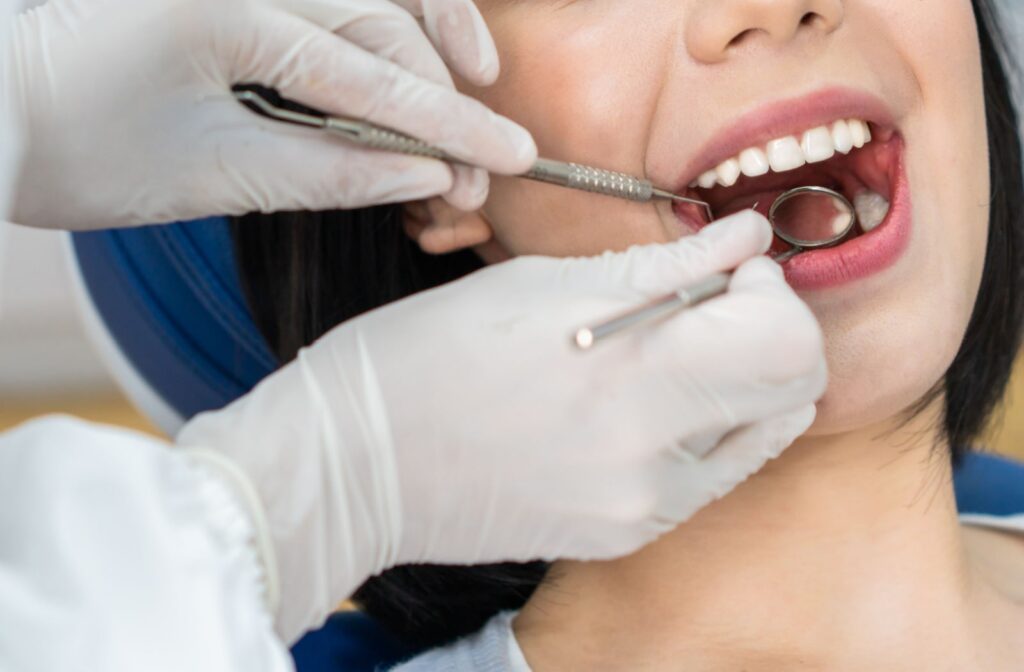Can Cavities Be Reversed?
Striving for better oral health usually includes visiting your dentist for regular check-ups, professional cleanings, and maintaining good oral hygiene habits at home, such as brushing and flossing. However, despite these efforts, you can still develop cavities.
On the positive side, you can reverse tooth decay or cavities in the early stages through proper dental care and dietary habits.
What Are Cavities & How Do They Form?
Cavities are areas of the tooth that have been damaged and may have developed a hole, also known as tooth decay. Children and adults can get cavities.
There are several types of cavities that adults tend to develop:
- Recurrent cavities: Cavities form around a filling where food and bacteria get caught. A tooth with a broken filling is also more likely to get a cavity.
- Root cavities: Cavities form on the roots of the teeth. Root cavities can result from gum recession from too hard brushing and gum recession with age. These expose the roots of the teeth, making them more likely to get cavities.
The underlying causes of cavities are rooted in hygiene and diet choices, although genetics also play a role. Common causes of cavities include the following:
- Bacteria in the mouth feed on sugars from food and drinks, producing acids that wear down tooth enamel.
- Poor oral hygiene can leave these acids unchecked, encouraging the erosion of the hard enamel covering the tooth. If damage continues below the enamel, it can cause it to break down entirely.
- Dry mouth can be a culprit, as saliva helps to neutralize acids in the mouth and clean teeth.
Cavity Formation
The first stage of cavity formation is enamel decay. It involves the development of a small demineralized area on the enamel, which shows no visible signs yet.
The second stage of cavity formation is dentin decay. If enamel decay is left untreated, demineralization can reach the underlying dentin, leading to sensitivity and pain.
The next stage of cavity formation is pulp damage. In the advanced stages, the decay can penetrate the pulp or inside of the tooth, potentially leading to infection and may require tooth extraction.

Is Reversing Cavities Possible?
Misinformation about oral care can lead to confusion. It is important to distinguish between what works and what does not in reversing tooth decay.
You can reverse the early stages of tooth decay. However, cavities cannot heal naturally. The primary approach to reverse cavities is remineralization or depositing lost minerals into the tooth’s enamel. The key to this approach is natural remedies, which focus on strengthening the enamel and improving oral conditions that encourage healing.
A natural way to reverse early cavities is fluoride, a mineral that helps to prevent cavities. Fluoride can also repair weakened enamel and cavities in the earliest stages. Reducing sugar and carbohydrate intake can significantly decrease acid build-up in the mouth. While avoiding sugar cannot reverse a cavity already there, it can prevent cavities from forming.
Treatment for Cavities
Your dentist may monitor a small cavity, recommend better hygiene practices, or fill the cavity. Without treatment, a cavity can increase in size, cause pain, infect the tooth root, and possibly lead to tooth breakage and, eventually, tooth loss. During a dental exam, your dentist can check for signs of a cavity, such as brown or black spots, before recommending treatment.
Treatment for cavities can include:
- In-office applications of fluoride in liquid, varnish, or gel form.
- Fillings are tooth-coloured or other materials used to fill the cavity and prevent further decay.
How to Prevent Cavities?
While reversing small or early-stage cavities is possible, you can take the following measures to improve your oral hygiene and reduce your risk of developing cavities:
- Regular brushing: At least twice a day with fluoride toothpaste.
- Flossing: Once a day to remove plaque from between teeth.
- Regular dental check-ups: Professional cleaning and early detection can prevent cavities from worsening.
- Avoid sugary foods and snacks: Opt for whole foods over processed snacks.
- Drink water: Water is a better beverage for your teeth. Staying hydrated also reduces the cavity-forming process.
- Sealants: Dental sealants are applied to the chewing surfaces of back teeth, helping to protect the enamel from decay.
Early Detection of Tooth Decay
The possibility of reversing early cavities is an exciting prospect in oral healthcare, but it should never be a substitute for preventive practices. With proactive oral health measures, such as brushing, flossing, and regular professional dental care, you can maintain and increase your chances of a healthy, cavity-free smile.
Cavities can develop gradually, and there are no signs of early-stage cavities, making regular dental exams and x-rays essential for detection. If you notice spots on your teeth, pain, or sensitivity, book an appointment with Dentistry on Danforth to prevent cavities from worsening and costly dental procedures.


